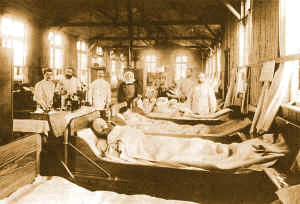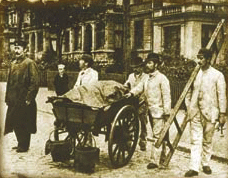
Fifth cholera pandemic
Encyclopedia


Cholera
Cholera is an infection of the small intestine that is caused by the bacterium Vibrio cholerae. The main symptoms are profuse watery diarrhea and vomiting. Transmission occurs primarily by drinking or eating water or food that has been contaminated by the diarrhea of an infected person or the feces...
that occurred in the years 1881-1896 starting in India. The 1892 outbreak in Hamburg
Hamburg
-History:The first historic name for the city was, according to Claudius Ptolemy's reports, Treva.But the city takes its modern name, Hamburg, from the first permanent building on the site, a castle whose construction was ordered by the Emperor Charlemagne in AD 808...
, Germany
Germany
Germany , officially the Federal Republic of Germany , is a federal parliamentary republic in Europe. The country consists of 16 states while the capital and largest city is Berlin. Germany covers an area of 357,021 km2 and has a largely temperate seasonal climate...
was the only major Europe
Europe
Europe is, by convention, one of the world's seven continents. Comprising the westernmost peninsula of Eurasia, Europe is generally 'divided' from Asia to its east by the watershed divides of the Ural and Caucasus Mountains, the Ural River, the Caspian and Black Seas, and the waterways connecting...
an outbreak; about 8,600 people died in Hamburg. Although generally held responsible for the virulence of the epidemic, the city government went largely unchanged. This was the last serious European cholera outbreak.
The epidemic was serious enough in Rome
Rome
Rome is the capital of Italy and the country's largest and most populated city and comune, with over 2.7 million residents in . The city is located in the central-western portion of the Italian Peninsula, on the Tiber River within the Lazio region of Italy.Rome's history spans two and a half...
that Pope Leo XIII
Pope Leo XIII
Pope Leo XIII , born Vincenzo Gioacchino Raffaele Luigi Pecci to an Italian comital family, was the 256th Pope of the Roman Catholic Church, reigning from 1878 to 1903...
built a hospice
Hospice
Hospice is a type of care and a philosophy of care which focuses on the palliation of a terminally ill patient's symptoms.In the United States and Canada:*Gentiva Health Services, national provider of hospice and home health services...
for afflicted residents inside the Vatican
Vatican Hill
Vatican Hill is the name given, long before the founding of Christianity, to one of the hills on the side of the Tiber opposite the traditional seven hills of Rome...
. That building would be torn down in 1996 to make way for construction of the Domus Sanctae Marthae
Domus Sanctae Marthae
The Domus Sanctæ Marthæ is a building completed in 1996 adjacent to Saint Peter's Basilica in the Vatican City built during the reign of Pope John Paul II...
.
Scientific debate
During the pandemic, Robert KochRobert Koch
Heinrich Hermann Robert Koch was a German physician. He became famous for isolating Bacillus anthracis , the Tuberculosis bacillus and the Vibrio cholerae and for his development of Koch's postulates....
isolated Vibrio cholerae
Vibrio cholerae
Vibrio cholerae is a Gram-negative, comma-shaped bacterium. Some strains of V. cholerae cause the disease cholera. V. cholerae is facultatively anaerobic and has a flagella at one cell pole. V...
and proposed postulates
Koch's postulates
Koch's postulates are four criteria designed to establish a causal relationship between a causative microbe and a disease. The postulates were formulated by Robert Koch and Friedrich Loeffler in 1884 and refined and published by Koch in 1890...
that explained how bacteria caused disease. This helped to establish the germ theory of disease
Germ theory of disease
The germ theory of disease, also called the pathogenic theory of medicine, is a theory that proposes that microorganisms are the cause of many diseases...
. Prior to this time, many physicians believed the disease was simply caused by direct exposure to the products of filth and decay. Koch helped establish that the disease was more specifically contagious
Contagious disease
A contagious disease is a subset category of infectious diseases , which are easily transmitted by physical contact with the person suffering the disease, or by their secretions or objects touched by them....
, and caused by exposure to the feces of an infected person.

